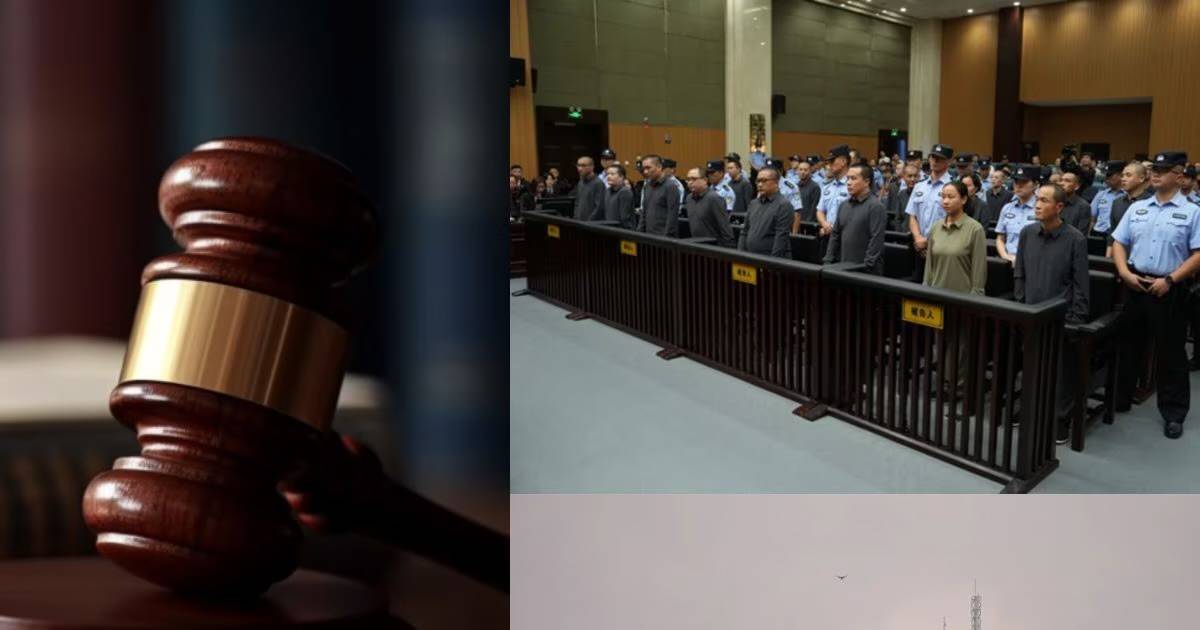China’s Harsh Verdict Against Ming Mafia Family
In a landmark ruling, a Chinese court has sentenced 11 members of the notorious Ming mafia family to death for running massive scam centres in Myanmar. According to Chinese state broadcaster CCTV, the verdict was delivered in Wenzhou, marking one of the toughest crackdowns on cross-border organized crime in recent years.
The Ming family, once considered untouchable in Myanmar’s Shan State, operated illegal casinos, drug networks, and online scam centres that generated over 10 billion yuan ($1.4 billion USD).
How the Ming Family Built a Criminal Empire
Since 2015, the Ming family became a dominant force in Laukkaing, a town on the Myanmar-China border. Initially, the town attracted Chinese gamblers seeking a haven where China’s strict gambling ban didn’t apply. But over time, Laukkaing transformed into a hub of money laundering, cyber fraud, drug trafficking, and human trafficking.
The Ming clan worked as one of four powerful families controlling Laukkaing. Their most infamous stronghold was Crouching Tiger Villa, a compound where over 10,000 forced workers were beaten, tortured, and coerced into running telecommunication fraud schemes targeting victims worldwide.
Mass Sentences Handed Down in Wenzhou Court
The trial sentenced a total of 39 members of the Ming family:
- 11 sentenced to death
- 5 received death sentences with a two-year suspension
- 11 given life imprisonment
- Others sentenced to 5–24 years in prison
The court found the group guilty of running illegal casinos, trafficking drugs, and committing acts of violence, including shooting scam workers to stop them from escaping back to China.
The ‘Scamdemic’ and Global Cybercrime
The United Nations has described Myanmar’s scam operations as part of a global “scamdemic”—a crisis in which over 100,000 foreign nationals have been lured, imprisoned, and forced into online fraud. Many of these workers were trafficked under false promises of employment and ended up trapped in compounds with no way out.
Each of the four families operating in Laukkaing processed billions of dollars every year, making these scam centres one of the most lucrative criminal industries in Southeast Asia.
China’s Growing Crackdown on Border Scams
China has taken a zero-tolerance stance on border crime. The government not only pursued the Ming family but also pressured neighboring countries like Thailand and Cambodia to act against similar networks.
Thousands of trafficked workers have already been repatriated to China, while Myanmar insurgent groups—backed by Beijing—drove out the Ming family’s operations in Shan State. The patriarch, Ming Xuechang, reportedly took his own life before capture.
Despite these efforts, the scam industry has adapted, shifting operations to Cambodia and other regions where enforcement is weaker.
What This Means for Global Security
The sentencing of the Ming family sends a powerful message: China is determined to dismantle transnational crime syndicates threatening its borders and citizens. However, experts warn that without stronger international cooperation, scam networks will continue to flourish in other parts of Southeast Asia.
FAQs About the Ming Mafia Sentences
1. Who were the Ming family?
They were a powerful clan in Myanmar’s Shan State, operating illegal casinos, scam centres, and trafficking networks.
2. How much money did they make?
Their scams generated over 10 billion yuan ($1.4 billion), according to Chinese courts.
3. Why did China sentence them so harshly?
The severity reflects China’s effort to deter cross-border crime and protect its citizens from large-scale fraud.
4. What happened to the workers in these scam centres?
Many were trafficked, imprisoned, and forced into online fraud. Thousands have since been rescued and repatriated.
5. Where are scam centres operating now?
While Laukkaing was a major hub, many operations have shifted to Cambodia and parts of Myanmar.
6. What’s next in China’s crackdown?
Beijing is expected to continue pressuring neighboring countries to shut down scam compounds and strengthen border security.
Conclusion
The death sentences handed down to the Ming family mark a turning point in China’s fight against cross-border cybercrime and human trafficking. While the crackdown has weakened Myanmar’s criminal networks, the scamdemic continues to evolve, shifting operations to other regions. The verdict highlights China’s determination to take a hardline stance, but it also underscores the urgent need for global cooperation against organized crime.




No comments yet
Be the first to share your thoughts!